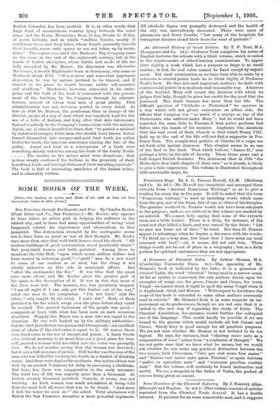A Grammar of Classical Latin. By Arthur Sloman, M.A. (Cambridge
University Press. 6s.)—The speciality of Mr. Sloman's book is indicated by the title; it is a grammar of classical Latin, the word "classical" being used in a narrow sense. As far as syntax is concerned, the only authors drawn upon for examples of usage are, for prose, Caesar and Cicero, for verse, Virgil—we cannot think it right to spell the name Vergil when it is Anglicised—Ovid, and Horace. "With regard to Accidence the scope of the book is extended to some other authors commonly read in schools." Mr. Sloman's book is in some respects an im- provement on its predecessors, though we are not sure that it is suited to the new way of regarding the study of Latin. The Classical Association, for instance, would further the colloquial use of the language. This would hardly be possible if we are bound to the purism which would exclude all but Caesar and Cicero. Surely Livy is good enough for all practical purposes. We are not sure whether Mr. Sloraan is not inclined to be too logical. He says, for instance, that "classing major natu as a, comparative of senex" arises from "a confusion of thought." We are not quite sure. that we know what he means, but we would ask whether he can make any practical distinction between the two usages, both Ciceronian, "Cato quo erat nemo fere senior" and "Ennius erat major natu quam Plautus," or again between "audivi ex maioribus natu" and "seniorum precibus excitati aunt." But his volume will certainly be found instructive and useful. We see a misprint in the Index of Verbs, the perfect of concino being given as concini.


































 Previous page
Previous page